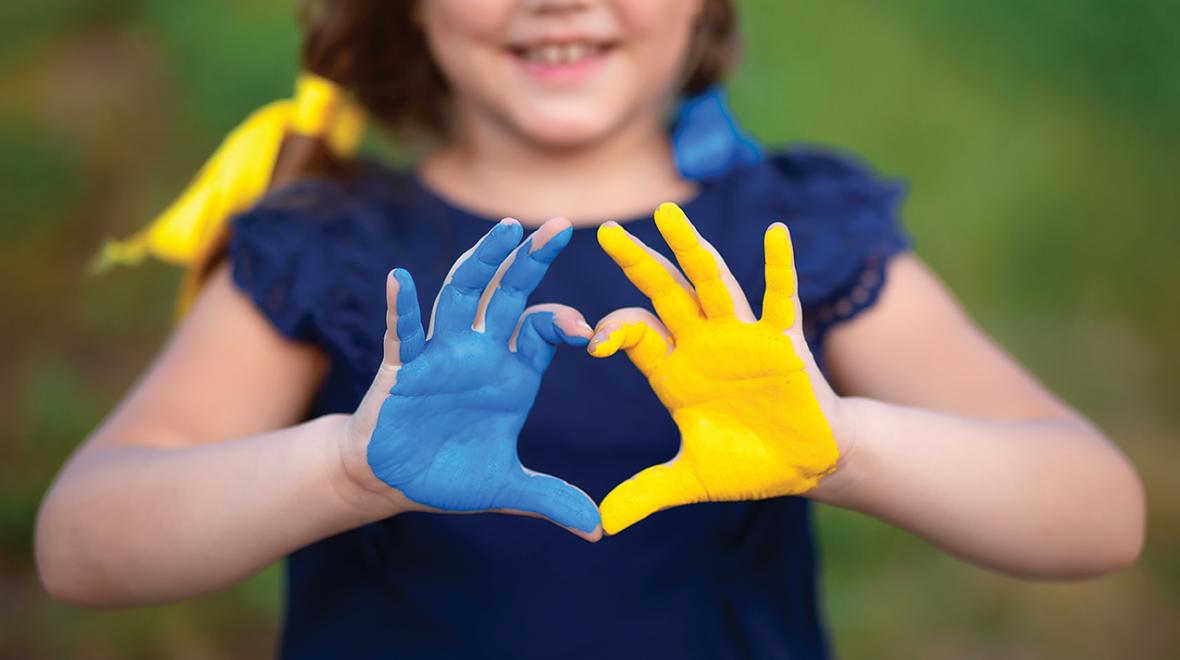
Note to ParentMap readers:Let’s take action to help alleviate the suffering of families in Ukraine — together.After careful research, ParentMap has pledged to support the tireless humanitarian aid efforts that U.S.-based nonprofit Nova Ukraine is undertaking. We encourage you to assist families, refugees and others suffering during this horrific time by donating through this dedicated secure Crowd Change form. ParentMap will match each gift made, up to a total of $18,000, for a combined contribution to Nova Ukraine of $36,000.Together we will make a difference. Together we can help ease the suffering of the people of Ukraine. Thank you! |
After chatting with a coworker about her Ukrainian relatives, Edmonds mom Shasta Perry knew she wanted to help. Her colleague shared the story of a relative with four young children who was sheltering in a basement as the Russian invasion ravaged their country.
“As a mom, hearing that really tore me up,” says Perry. “I cannot imagine how she must be feeling right now and how her kids might be feeling.”
Perry’s 8-year-old child wanted to help as well, so they gathered items such as first aid kits and sleeping bags to donate to a Ukrainian church.
Donating to help Ukraine — or explaining that our country is supporting relief efforts — is one way to help children process these tragic events, psychologists say. As heartbreaking stories fill the news and filter into schoolyard conversations, children will likely pick up on these world events and want to know more. That’s why it’s important to have honest conversations about the war at a developmentally appropriate level, experts say.
Parents can also tell their kids that President Biden and other world leaders are united in stating that the attack is not okay and that they are taking steps to try to change the situation, says Shannon Dorsey, Ph.D., a professor of psychology at the University of Washington and mom of an 8-year-old boy who has lots of his own questions about Ukraine and Russia.
Talking to your kids
Before engaging in what could be a tough conversation, parents should first reflect on their own feelings and emotional state, according to a guide to explaining war from the University of Pennsylvania’s Graduate School of Education. This moment to pause and reflect is especially important since parents are models for their child’s emotional regulation.
When you’re ready to talk with your child, consider the timing of the discussion, Dorsey suggests. For example, it’s probably best to avoid potentially worrisome conversations before bedtime. Begin by asking what they have already heard and what questions they may have — some of their questions may surprise you, Dorsey notes.
“Young children may not understand the distance between where they live and Ukraine,” says Dorsey. “They also may have heard inaccurate information from peers who themselves are trying to make sense of what they’ve heard or seen.”
The depth of these discussions will vary depending on the child’s developmental stage and capacity for understanding, says Edmonds psychologist Kate Lund, Psy.D. Use simple language to share basic facts and reassure them that they’re safe right now. Validating their feelings is important, too.
“Acknowledge that this is really scary and that we don’t have all the answers,” says Lund.
Parents can also find ways to help children manage their stress response, whether it’s through deep breathing or imagining themselves in their favorite happy place. These are skills that can be effective in other anxiety-provoking situations, too.
“Whenever we’re facing a stressor, we want to help folks develop the capacity to quiet their minds,” says Lund.
Finding a way to help
Kids of families that want to personally donate might feel more of a connection to helping if they concretely understand whom they might help and how, experts say. Here are a few organizations and opportunities that specifically assist Ukrainian children and families:
Ukrainian Association of Washington: This Renton-based nonprofit focuses on preserving Ukrainian heritage locally. The organization is presently collecting donations such as medical supplies to send to Ukraine, according to its Facebook page.
Ukrainian Community Center of Washington: This local organization, which offers programs and support services for Eastern European refugees and immigrants, is accepting donations via its website. “We are grateful to everyone who makes a donation, to those who understand the situation in Ukraine and support us,” a member wrote in an email to ParentMap.
UNICEF: This humanitarian organization works to help children throughout the world. One can designate donations to help Ukraine’s children access “safe water, nutrition, health care, education and protection.”
“Children are the least responsible for armed conflict in Ukraine, but they suffer most from its consequence,” the nonprofit notes on its website.
CARE: This international humanitarian organization’s Ukraine Crisis Fund is prioritizing women and girls, families and the elderly, according to its website. Emergency gifts to the fund will provide millions with food, water, hygiene kits, psychological support and cash assistance.
Save the Children: This organization, which was founded more than 100 years ago, focuses on humanitarian aid around the world. The organization recently issued an emergency alert on its website that states, “We are gravely concerned for children in Ukraine … who might be caught in the middle of armed conflict, forced to flee their homes, and exposed to injury, hunger and sub-zero temperatures.” Donations to the group’s Ukraine Crisis Relief Fund provide children and families with food, water, hygiene kits, psychosocial support and cash assistance.
Sunflower of Peace: This small Boston-based nonprofit organizes support for Ukrainian orphans and internally displaced people. During the current situation, it’s focusing on providing medical assistance and other necessities. A statement on its website reads: “We are acquiring and distributing first-aid backpacks, medicine, medical instruments and other means of survival that are saving hundreds of lives.” There is a form on the website for people interested in volunteering, including remote volunteering opportunities.
Voices of Children: This Ukraine-based charitable foundation focuses on the psychological needs of children affected by war, using strategies such as art therapy and individual support. Its mission statement: “Our objective is that every child who has suffered from the war in Ukraine must get psychological help in time.”
Nova Ukraine: Based in Donetsk, this organization is mobilizing the humanitarian aid coming to it to assemble supply packages for families and orphans, including diapers, baby food, hospital supplies and food.











